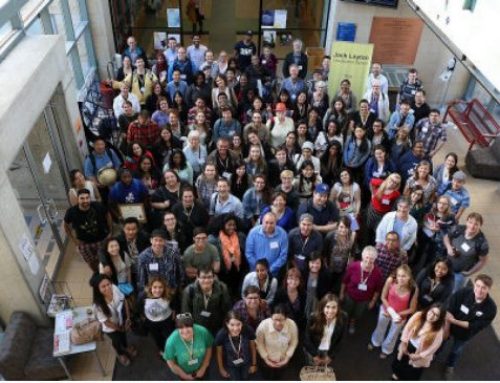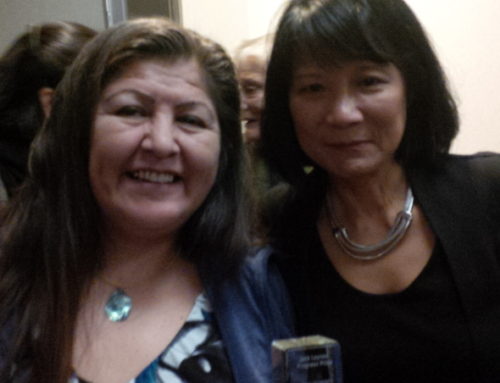Toronto Star: Amid the Grief, Olivia Chow Finds Strength and a Renewed Sense of Purpose
TORONTO – Olivia Chow is on a mission. She’s had a terrible year since her husband Jack Layton died, and if it’s been that bad for her with all her support, she can only imagine what it’s like for others knocked over in grief and struggling alone.
Chow wants to help.
It’s in her nature to meet a deeply personal problem by seeing the big picture. She gives speeches on coping with loss — to patients in palliative care, medical professionals, and union groups — and builds her own research library.
She doesn’t pull punches or try to pretend it’s not a daily fight just to keep it together.
“I know shutting it down is not a good idea so I keep doing political work,” she says, over lunch on a summer afternoon in Layton’s old stomping grounds of Toronto—Danforth riding. “If I let the grief shut me in, I may not come back up.
“I may stop being who I am.”
Layton’s death at 61 last Aug. 22 stunned a nation and left his party struggling to find a new leader, a few months after he boosted the party to official Opposition status. His widow was in shock while she dealt with tributes and, ultimately, a state funeral at Roy Thomson Hall.
Chow and the family have never revealed the specific cause of death, other than to say it was a “non-prostate cancer.”
It’s a tough interview, not so much for the questions, but because she agreed to meet in a favorite restaurant on the Danforth, where the couple often lingered with friends over lightly fried calamari and stuffed vine leaves. Every corner reminds her of Jack and, this weekend, the community celebrates “Taste of the Danforth.”
Layton and Chow never missed a year together.
She arrived for lunch on her bike, a slight, straight-backed figure, seemingly vulnerable to a big wind. She says she hasn’t lost weight since Layton died, but appears tinier in a simple black shift.
Chow, 55, is a political animal to the core, not merely in the sense of official parties and causes but in knowing how to use her experience. She wasn’t even able to deal with thyroid cancer a few years back without joining the fight against a U.S. drug company that was manufacturing a thyroid drug in Canada, but making it available only in the States.
She has a rock-solid support system that includes her parents and her stepchildren, city councillor Michael and Sarah, who’s married to Hugh Campbell. Chow’s grandchildren, Beatrice, 3, and baby Solace, are her delight.
Moreover, she gets constant affirmations. Will she run for mayor to replace Rob Ford in 2014?
It’s a question a lot of people are asking her. No, she says. Until Ottawa pays Toronto what the city deserves in federal moneys — for say, a transit plan — she sees her place in Ottawa as MP for Trinity—Spadina.
She believes she can help others with grief. Says Chow: “Think about it — more and more people are going to be dealing with what I’ve gone through. Many women are going to become widows because they live longer than men.”
At times, she’s almost lost it before an audience, clenching every muscle in her body and concentrating laser-like on her notes in order to distract from the pain. Like others who must hack a life path through grief, she’s holds on by her fingernails. The grief “comes in waves . . . You’re OK and all of a sudden it hits you.”
This summer is difficult with its triple-punch memories: their wedding anniversary (July 9), Layton’s birthday (July 18) and the first anniversary of his death, creeping ever closer, with events that include burial of his ashes at the Necropolis and a celebration at Nathan Phillips Square.
She’s already lived through the first Christmas, the birth of a grandchild and NDP triumphs in the House of Commons without Layton.
The lowest period came before Christmas. She was travelling and didn’t get a flu shot and was sick for three days in October. She soldiered on, having to literally lean on friends for support at the NDP Christmas party. That night, she ended up in her Sparks St. apartment, flat on her back and breathing with difficulty. Even then, she took the train home to Toronto.
She saw her family doctor in Toronto and spent a night in hospital for treatment. She had a blood clot on her lung, initially hidden in X-rays because it was behind her heart.
She had no choice except to rest and take antibiotics. Even then, she says, she didn’t take sleeping pills.
She recommends therapy. She went once to a psychiatrist at Princess Margaret Hospital, where Layton was treated for cancer. The doctor had given her his card, saying he knew what she would be going through, and she found him to be “wonderful.” To date, she hasn’t returned.
“It’s really a journey. You just can’t predict and everyone is different,” she says. “It’s not stages 1, 2, 3, 4, 5 like they say.”
She has a reading list at the ready. Among others, it includes: A Memoir (Joyce Carol Oates),Kayak Morning: Reflections on Love, Grief and Small Boats (Roger Rosenblatt), and When Things Fall Apart: Heart Advice for Difficult Times (Pema Chodron).
She has no idea what happens after death and concentrates on the here and now. “I miss him all the time, but his spirit is part of us.”
In his last letter to Canadians, Layton focused on love, hope and optimism and Chow holds that message to her heart. “He believed in people’s goodness. He never, ever questioned motives. People saw that and responded.”
She’s says she’s open to anything. “It’s not a horrible thing to fall in love.”
After the interview, she toddles off on her flower-adorned bike, a woman who’s likely far from finished making her own mark on Canada.




![[VIDEO] Jack Layton Funeral – Steven Page sings Hallelujah](http://rememberingjacklayton.ca/wp-content/uploads/2015/03/Stephen-Page-500x383.jpg)
